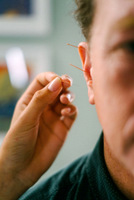 Acupuncture helps acute pain is the assessment of collaborators from four American medical and nursing schools. They concluded that the majority of reviews found acupuncture to be efficacious for acute pain, with potential to avoid or reduce opioid reliance. The research updates the evidence base for acupuncture for acute pain, with a review of systematic reviews and meta-analyses on postsurgical/perioperative pain with opioid sparing, and acute nonsurgical/trauma pain. The latter included pain in the emergency department.
Acupuncture helps acute pain is the assessment of collaborators from four American medical and nursing schools. They concluded that the majority of reviews found acupuncture to be efficacious for acute pain, with potential to avoid or reduce opioid reliance. The research updates the evidence base for acupuncture for acute pain, with a review of systematic reviews and meta-analyses on postsurgical/perioperative pain with opioid sparing, and acute nonsurgical/trauma pain. The latter included pain in the emergency department.
In the US, there has been mounting pressure for pain medicine to shift away from an overreliance on opioids and overutilized procedures and surgeries, toward more comprehensive pain care that includes evidence-based non-pharmacological strategies. The researchers say that the evidence base for acupuncture is extensive. Acupuncture is supported or recommended as part of pain care by the US Agency for Healthcare Research and Quality, the US Food & Drug Administration, the US Department of Health and Human Services, and the largest hospital accreditation organization in the US, The Joint Commission. Further, the American Academy of Family Physicians endorsed the American College of Physicians Guidelines recommending acupuncture as a first option for acute, subacute, and chronic lower back pain.
A total of 22 systematic reviews, including 17 with meta-analyses of acupuncture in acute pain settings and a review for pain in the intensive care unit, were included in this study. In the emergency department setting, studies reported high acceptability of acupuncture by patients. Acupuncture produced a decrease in pain comparable to that produced by drugs, with the additional benefit of a reduction in anxiety.
The effectiveness of acupuncture coupled with a very low rate of adverse events, is reflected in the authors’ summary. “The evidence supporting effectiveness, safety, reduced need for opioids and NSAIDs, and improved patient satisfaction is a compelling reason for acupuncture therapy to be covered for acute pain by public and private insurance. Policy barriers preventing licensed acupuncturists from being Medicare-billing providers need to be addressed. Health care practitioners and administrators need training in the evidence base for acupuncture therapy, and they need to advocate for policy initiatives that remedy systemic reimbursement barriers to evidence-based comprehensive pain care strategies.”
(Acupuncture Therapy as an Evidence-Based Nonpharmacologic Strategy for Comprehensive Acute Pain Care: The Academic Consortium Pain Task Force White Paper Update. Pain Medicine, September 2022.)

 American clinicians have found that a type of ear acupuncture termed battlefield acupuncture, reduces pain and opioid use in military veterans undergoing surgery. A total of 72 patients, mean age 64 and scheduled for major surgery under general anaesthesia, were randomly assigned to receive either ear acupuncture or sham acupuncture for postoperative pain. Surgery was typically abdominal, thoracic or for hip/knee replacements.
American clinicians have found that a type of ear acupuncture termed battlefield acupuncture, reduces pain and opioid use in military veterans undergoing surgery. A total of 72 patients, mean age 64 and scheduled for major surgery under general anaesthesia, were randomly assigned to receive either ear acupuncture or sham acupuncture for postoperative pain. Surgery was typically abdominal, thoracic or for hip/knee replacements.